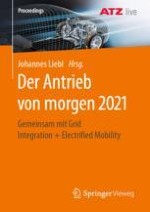2021 | OriginalPaper | Buchkapitel
Potential of the methanol-powered SI engine in the hybrid powertrain: A simulative investigation
verfasst von : Michael Bargende, Feyyaz Negüs, Viktoria Kelich, Christian Beidl, Alexander Kuznik, Michael Grill, Arndt Döhler, André Kulzer
Erschienen in: Der Antrieb von morgen 2021
Verlag: Springer Berlin Heidelberg
Aktivieren Sie unsere intelligente Suche, um passende Fachinhalte oder Patente zu finden.
Wählen Sie Textabschnitte aus um mit Künstlicher Intelligenz passenden Patente zu finden. powered by
Markieren Sie Textabschnitte, um KI-gestützt weitere passende Inhalte zu finden. powered by
In order to meet future CO2 emission requirements and to contribute to reducing greenhouse gases of the mobility sector, the vehicle powertrain must prove much better efficiencies than today’s standards. In this context, various engine technologies and alternative fuels need to be considered for the internal combustion engines as well as different hybrid concepts and powertrain configurations. This paper focuses on the usage of methanol due to its promising properties in combination with different hybridized powertrains to determine vehicle efficiency limitations in WLTC and RDE.For the investigation of the efficiencies of the internal combustion engine, a series of technologically advanced SI engine models are designed and optimized using 0D/1D methods to generate efficiency and BSFC maps for the different engine models that enable the comparison of methanol with gasoline. Thanks to methanol’s much higher knock resistance, the center of combustion can be kept at its optimal value of 8°CA at all times, despite an increase of the compression ratio by about 4 units. Also, the lower combustion temperatures observed during the methanol combustion lead to significant additional benefits.For a precise quantification of the advantage of methanol, further simulation investigations are conducted by integrating the methanol powered engine into different hybridized powertrains (P1, P2, PS) in a C-segment vehicle. The simulation models (map-based internal combustion engine model, rule-based hybrid strategy, vehicle model, etc.) are embedded into a Co-simulation environment, which allows a robust model-based global optimization by adjusting various component configurations (battery capacity, electric motor power, differential transmission ratio) and operating strategy parameters (load point shifting, gear shifting characteristics). Finally, the different variants are analyzed for several RDE routes and assessed in regard of their robustness of the achieved vehicle efficiencies. It can be shown, that vehicle efficiencies in WLTC of up to 44.7% can be reached using a methanol powered engine and high voltage hybridization which surpasses the achieved efficiencies with a gasoline powered engine and clarifies the efficiency benefits that can be gained through methanol.
